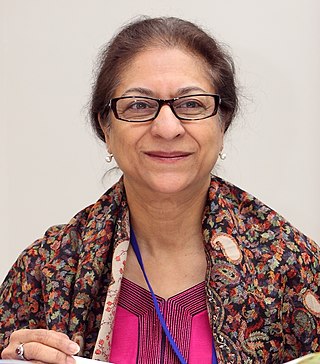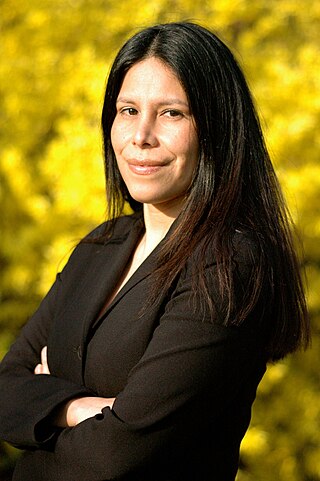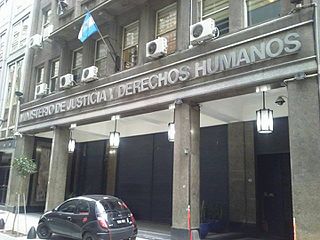Related Research Articles

The University for Peace (UPEACE) is an international university and intergovernmental organization established as a treaty organisation by the United Nations General Assembly in 1980. The university offers postgraduate, doctoral, and executive programmes related to the study of peace and conflict, environment and development, and international law.
The United Nations Prizes in the Field of Human Rights were instituted by United Nations General Assembly in 1966. They are intended to "honour and commend people and organizations which have made an outstanding contribution to the promotion and protection of the human rights embodied in the Universal Declaration of Human Rights and in other United Nations human rights instruments".

Asma Jilani Jahangir was a Pakistani human rights lawyer and social activist who co-founded and chaired the Human Rights Commission of Pakistan and AGHS Legal Aid Cell. Jahangir was known for playing a prominent role in the Lawyers' Movement and served as the United Nations Special Rapporteur on Freedom of Religion or Belief and as a trustee at the International Crisis Group.
Mireille Roccatti Velásquez, is a Mexican scholar and jurist who served as the first female president of the country's National Human Rights Commission.

Federico Mayor Zaragoza is a scientist, scholar, politician, diplomat, and poet from Spain. He served as the Director-General of the United Nations Educational, Scientific, and Cultural Organization (UNESCO) from 1987 to 1999. After his tenure as Director-General, he continued to participate in various peace-related organizations such as the Foundation for a Culture of Peace and the International Decade for the Promotion of a Culture of Peace and Non-Violence for the Children of the World, as a member of their honorary boards. Additionally, he serves as the honorary chairman of the Académie de la Paix.

Nyameko Barney Pityana FKC GCOB is a human rights lawyer and theologian in South Africa. He is an exponent of Black theology.
AMDH may refer to:
Academia Mexicana de Derechos Humanos MEXICANOS is a human rights group based in Mexico. According to its website, the Academia Mexicana de Derechos Humanos is a non governmental, independent and plural organization founded in 1984 that has contributed in an active manner to the creation of a vigorous pro-human rights movement in Mexico.

José "Pepe" Zalaquett Daher was a Chilean lawyer, renowned for his work in the defence of human rights during the de facto regime that governed Chile under General Augusto Pinochet from 1973 to 1990.

Sergio Aguayo Quezada is a Mexican academic and human rights activist. He has been a professor and researcher for El Colegio de México since 1977, visiting professor at Harvard University since 2015 and a member of the Mexican Researchers National System

Andrés Roemer Slomianski is a Mexican writer, former ambassador to UNESCO, and fugitive.
The Permanent Assembly for Human Rights is an Argentine non-governmental human rights organization; founded in 1975. According to its official website the organization is the product of a "call from people coming from distinct areas: the church, politics, Human Rights, sciences, culture, and labour Argentinians in response to the increasing violence and the collapse of the most elemental Human Rights in the country".

Modesto Seara Vázquez was a Spanish-born Mexican jurist and academic. He lived in several countries but has spent most of his life in Mexico. He has actively participated in Mexican life as a professor at the National Autonomous University of Mexico and since 1988 as the Rector of the Oaxaca State University System in the State of Oaxaca. He died in Mexico City on 26 December 2022, at the age of 91.
Jesús Ballesteros is a Spanish philosopher and jurist.

Monica Feria Tinta is a British/Peruvian barrister, a specialist in public international law, at the Bar of England & Wales. She practises from Twenty Essex, London.

The Ministry of Justice of Argentina is a ministry of the national executive power tasked with enforcing of the law and administration of justice.
The Jaime Brunet International Prize was established in 1998 with the objective of distinguishing people, organizations and institutions that promote the defence of human rights. It is awarded by the Jaime Brunet Foundation of the UPNA. This award also aims to recognize the work of those who fight to eliminate situations of inhumane or degrading treatment in violation of people's inherent rights to dignity. The prize consists of a diploma, a sculpture commemorating the award and €36,000 in cash.
María Soledad Cisternas Reyes is a Chilean lawyer and disability rights activist. Cisternas, who became blind while she was in college has worked to increase access for people with disabilities in Chile and at the United Nations (UN). She was on the committee that drafted the Convention on the Rights of Persons with Disabilities and served as the chairperson on the Committee on the Rights of Persons with Disabilities. In 2017, Cisternas was appointed the Special Envoy on Disability and Accessibility for the UN.
The Interdisciplinary Group of Independent Experts for Bolivia is a committee of jurists and human rights experts created by the Inter-American Commission on Human Rights (IACHR) to carry out a parallel investigation of human rights violations during the 2019 Bolivian political crisis, covering the period from 1 September 2019 to 31 December 2019. The group was established following discussions between the IACHR and the interim Bolivian government led by Jeanine Áñez in December 2019, and an agreement between the two in January 2020. Its four members were appointed on 23 January 2020. The Group was supported by a five-member technical team and the Argentine Forensic Anthropology Team. The Group began its work in Bolivia on 23 November 2020 and issued its final report on 23 July 2021.
References
- ↑ "UN honours Archbishop Emeritus Desmond Tutu for his contribution to human rights". UN News. 2012-11-28. Retrieved 2021-08-14.
- ↑ "Asma Jahangir wins UNESCO/Bilbao Prize for the Promotion of a Culture of Human Rights | United Nations Educational, Scientific and Cultural Organization". www.unesco.org. Retrieved 2021-08-14.
- ↑ "French human rights advocate receives UNESCO prize for lifetime's work". UN News. 2008-11-19. Retrieved 2021-08-14.